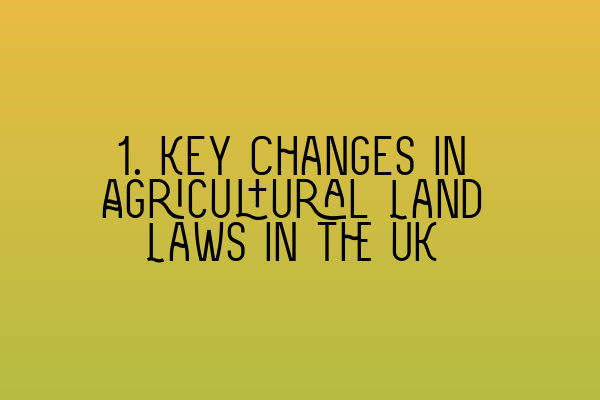Key Changes in Agricultural Land Laws in the UK
Agriculture plays a vital role in the economic and social fabric of the United Kingdom. The laws that govern agricultural land have a significant impact on farmers, landowners, and the overall agricultural industry. In recent years, there have been several key changes in agricultural land laws that have shaped the landscape of the industry. In this article, we will explore these changes and the implications they have for those involved in the agricultural sector.
1. Environmental Stewardship Schemes
In an effort to promote sustainable farming practices and protect the environment, the government has introduced various environmental stewardship schemes. These schemes aim to reward farmers for adopting environmentally-friendly practices such as soil conservation, wildlife habitat creation, and water resource management. The Countryside Stewardship Scheme and the Environmental Land Management Scheme (ELMS) are two prominent examples of these initiatives.
Under these schemes, farmers can receive financial incentives for implementing conservation measures on their land. This not only benefits the environment but also improves the long-term viability of the agricultural industry. To learn more about the environmental stewardship schemes and how they can benefit your farm, check out our related article on SQE 1 Practice Exam Questions.
2. Agricultural Tenancies Act 1995
The Agricultural Tenancies Act 1995 introduced significant changes to the legal framework governing agricultural tenancies. This legislation created two types of agricultural tenancies: farm business tenancies (FBTs) and agricultural holdings. FBTs provide increased flexibility for both landlords and tenants, allowing for greater negotiation and variation of rental agreements.
Agricultural holdings, on the other hand, provide tenants with greater protection and security of tenure. The Act also introduced additional provisions relating to rent reviews, succession rights, and compensation for improvements made by tenants.
If you are interested in learning more about agricultural tenancies and the legal implications they have for farmers and landowners, we recommend reading our article on SQE 1 Practice Mocks FLK1 FLK2.
3. CAP Reform and Brexit
The Common Agricultural Policy (CAP) has long been a cornerstone of the agricultural industry in the UK. However, with the UK’s departure from the European Union, changes to CAP funding and regulations were inevitable. The Agricultural Transition Plan has outlined how the UK government intends to phase out direct payments and transition towards a new system of farm support.
Under the new system, farmers will be encouraged to adopt sustainable farming practices and will be rewarded for delivering environmental and public goods. This represents a shift towards a more results-based approach to agricultural support.
To prepare for the changes in farm support and understand how they might impact your business, we recommend exploring our article on SQE 2 Preparation Courses.
4. Farming Grants and Subsidies
In addition to the changes in farm support, the UK government has also introduced various farming grants and subsidies to help farmers invest in their businesses and improve productivity. These grants cover a wide range of areas, from infrastructure development to agricultural innovation.
Understanding the available grants and subsidies and how to navigate the application process is crucial for farmers looking to access financial support. Our article on SQE 1 Preparation Courses provides valuable insight into the grant application process and can help you identify opportunities to secure funding for your farm.
Conclusion
The agricultural industry in the UK is constantly evolving, and it is crucial for farmers and landowners to stay informed about the key changes in agricultural land laws. From environmental stewardship schemes to agricultural tenancy reforms, from CAP reform to farming grants and subsidies, these changes have a significant impact on how agricultural businesses are operated and managed.
By staying up to date with these changes and understanding their implications, you can adapt your farming practices to take advantage of new opportunities and ensure the long-term sustainability of your business. To stay informed about the latest developments in agricultural land laws and other legal matters related to property, bookmark our blog and visit our website regularly.
To stay on top of your legal knowledge, consider signing up for our SRA SQE Exam Dates. Our experienced team of solicitors and experts at SQE Property Law & Land Law is here to support you in all your legal needs.
